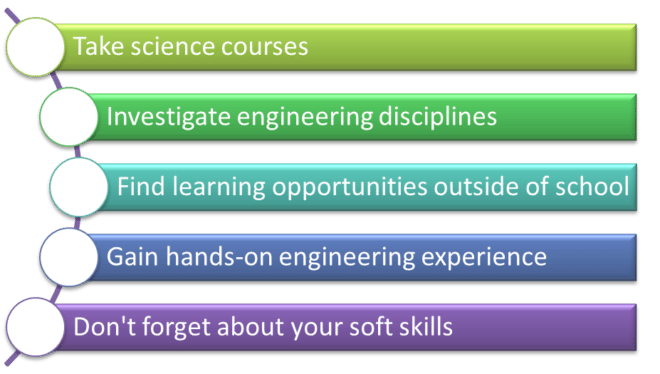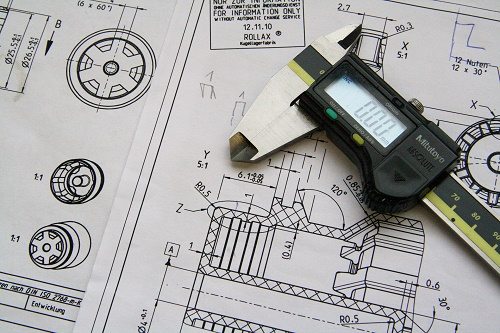If you’re eyeing a career in engineering, there are plenty of things you can do before you even begin applying to college that will help you succeed. Engineering is not an easy field of study by any means. In fact, though more than one-third of all college students plan to earn a degree in engineering or a similar science, technology or mathematics field of study, fewer than half of these ambitious students actually graduate with their intended degree within five years, according to CBS News. By preparing to earn an engineering degree while you are still in high school, you can help increase your chance of getting accepted into an engineering school, getting the grades you need to earn your degree on time and finding your first engineering job.
Take High School Science and Math Courses
An engineering education includes a rigorous course load. Engineering students fill their schedules with classes in engineering principles, practical design fieldwork, laboratory science classes and high-level mathematics. If you don’t start out with a strong foundation in the life and physical sciences and in math, you will have a hard time keeping up – and ultimately, earning your bachelor’s degree in engineering.
IMAGE SOURCE: Pixabay, public domain
One way you can prepare for a college education in engineering is to take plenty of math and science classes in high school. Subjects such as physics, chemistry and pre-calculus or calculus are valuable to aspiring engineering students. You might also find is useful to take computer programming, drafting and trigonometry courses. If possible, try to take at least four years of math classes, three years of laboratory science courses and any computer science or engineering classes that your high school offers, HuffPost advised. Additionally, taking advanced placement (AP) or honors courses while in high school is often a good idea for prospective engineering students.
Honors and AP courses can impress college admissions and engineering departments and prepare students for the rigorous requirements of an engineering education.
Figure Out What Engineering Discipline Is Right for You
Your college decision-making isn’t finished once you decide to study engineering. In fact, you now have to make what might be an even more difficult choice: what branch of engineering you want to pursue. While there are some foundation courses that college students in all disciplines of engineering must take, much of what you will study in college depends on which branch of engineering you choose.
Deciding early on which engineering major to pursue can help you make smart choices in high school, as well. For example, if you want to be an aerospace engineer, you could benefit from studying computer languages in high school, the United States Bureau of Labor Statistics (BLS) reported. On the other hand, aspiring chemical engineers would do better to take classes such as biology, trigonometry and algebra, according to the BLS. Prospective electrical and electronics engineers should study drafting in high school so that they will have the skills to create technical drawings, the BLS reported.
College curriculum, job duties, work settings and even salary potential depend a great deal on what kind of engineer you become.
Check Out Online Resources for Prospective Engineering Students
Don’t rely on your high school to teach you everything you need to know to prepare for an engineering education. Creativity and curiosity are among the most important traits an engineer should have. You can, and should, follow that thirst for knowledge and learn as much as you can both in the classroom and outside it.
Where can aspiring engineering students start looking for more to learn? Many highly respected engineering schools offer resources and even introductory engineering courses online. You can learn more about engineering concepts and practices at your own pace, from anywhere in the world.
Often, distance learning introductory engineering courses made for independent study are offered free of charge.
Look for Hands-On Experience Opportunities
Are you the kind of person who likes to take things apart and put them back together again so you can learn how they work? Many engineers enjoy learning through real-world experience rather than just from textbooks. In fact, fieldwork, co-op experience and internships are integral to an engineering education. Even though you haven’t started college yet, you can take advantage of STEM (science, technology, engineering and mathematics) workshops and educational events. Some top schools offer online or face-to-face science and engineering enrichment programs, and these opportunities are especially plentiful when high school is out for the summer.
Summer STEM programs are often designed to get high schoolers interested in science and engineering, so they may focus on fun subjects such as music and robotics.
Build Your Soft Skills
While an engineering curriculum might emphasize science, math and technology, soft skills are still essential for success in an engineering career. Speaking, writing, listening, problem-solving, organization and leadership skills are among the most important skills engineers can have, according to the BLS. While it’s important to focus on your science and math courses, don’t forget about the activities that can help you develop communication, critical thinking and people skills. Sports, clubs, hobbies and social interactions are valuable experiences no matter what major you plan to pursue in college, because they help you to become a well-rounded person and gain life skills.
Prospective engineering students should complete at least four years of English or language arts studies, two years of social studies and two to three years of foreign language studies.
Additional Resources:
Top 10 Highest Paying Engineering Careers


